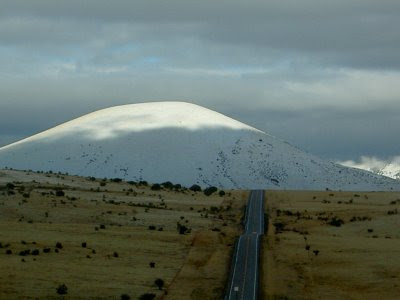This blog is my forum for venting, for congratulating, for questioning and for suggesting, especially on subjects of spirituality, the news, and whatever strikes me from day to day. I am also on Twitter at @epp_g
Sunday, March 22, 2009
Sunday reflections from Shekinah
Some Sunday notes from Shekinah:
Shekinah had two groups of guests this weekend. Down in the Chalet was a Cub Scout troop; in the Timberlodge were 45 or so women from a Baptist church in Saskatoon, retreating for a short time from the busyness of their lives. Agnes and I were their hosts.
Note 1: Before we served them lunch, the women’s group held a worship service in the great hall of the Lodge. They were singing off a screen just as I walked through the room with an armload of mattress covers, a song I didn’t know honouring the majesty and glory of God. Just as they concluded, the snow on the roof let go and avalanched onto the deck with a thunderous roar. The ones nearest the window dived for cover before they realized that the sky was not falling, or that the Lord was not particularly adding audio-visual effects to their song. They were silent for a few seconds until the relief of knowing that they were safe set in, when they burst into spontaneous laughter.
Note 2: From the Timberlodge, I went down to the Chalet to check on the cub scouts. A dozen or so 10 year-olds were seated in a circle on the floor with their leaders; they obediently sang out “Good morning, George,” when I walked in. They wore brown shirts with yellow bandanas tied around their necks. I had some work to do in the furnace room, but I heard their leader say, “We ought to start our day with ‘O Canada,’ I guess,” but they didn’t sing it. I think they forgot to bring a song leader.
Note 3: In some of our (Shekinah’s) literature, you’ll find a note that says people experience the presence of God in this place. This morning, walking along the path that leads from the Timberlodge, past the silent cabins nestled among the poplars to the Chalet, I experienced what I think they meant. The squirrels have decided that winter is over and their footprints are everywhere; I startled a pair of chickadees and one of them flew past my ear so close that I could feel the breath of her wing-beats; the wind whispered through the treetops above and I remembered how the spirit is described as a wind in scriptures.
It’s clear that the Spirit of God hasn’t taken up residence at Shekinah; that would be antithetical to our faith. But it is also clear that many people who have felt themselves starved of the spirit in the busyness of their lives have felt the breath of the spirit here whereas they have been missing it walking day after day on concrete streets and tiled floors.
From here, you can’t see a single habitation (well, one, actually, since last fall, across the river), a single town, a single factory. Cell phones don’t work here; your laptop won’t connect you with the internet unless you’re in the office building.
Note 4: A minister dropped in a few weeks ago. In the course of our conversation he asked me this: Why do you call this place Shə-KEE-na? It’s actually pronounced Shə-KY-na. I know he was trying to impress me with his erudition, particularly as regards the Hebrew language, but to be kind I said. “That’s interesting! I call it Shə-KEE-na because everyone calls it that, and has since it was established!” (Incidentally, the Oxford entry in Babylon pronounces it Shə-KEE-na, and the meaning is: “the glory of the divine presence, represented as light or interpreted (in Kabbalism) as a divine feminine aspect.”)
Note 5: I’m listening—as I write this—to Tapestry on CBC 1. It’s an interview with the author of a biography of the current Dalai Lama. The author says that the Dalai Lama would say, “We don’t need religion; what we need is basic human kindness.” I didn’t get whether he actually said this or whether it’s a condensation of some things he has said.
Copyright 2009, gepp
Wednesday, March 11, 2009
Stem cell research

What does embryonic stem cell research have to do with me?
What is moral? What’s immoral? What’s amoral?
I remember a discussion in church a long time ago on the subject of sin. Specifically, it questioned why we never hear the word anymore and whether or not we’ve written the concept of sin out of our theology—or at least out of our dialogue about our theology.
Interesting word, sin.
“The soul that sinneth, it shall die (Ezekiel 18:4),” says the prophet Ezekiel. “But he that sinneth against me [the LORD] wrongeth his own soul (Proverbs 8:36.).” (References to KJV)
This is serious stuff.
It may have been in the backs of our minds the other day as we talked over lunch about President Obama’s move to end the restriction on embryonic stem cell research. On the one hand, such research may open the door for shysters to make a business of harvesting embryos (human offspring in the first eight or twelve weeks from conception –
So is it immoral (sinful) to research embryonic stem cell harvesting? Although a broad moral code regarding the sanctity of life could be applied here, we lack a specific “moral law” that could be applied. I assume it would be clearly immoral to kill a person in order to harvest his organs for sale, and so it would likely be clear as well if we deliberately destroyed a developing embryo for the sale of its stem cells. We have already settled the question of utilizing organs of consenting, deceased persons. We accept it as a moral act. A fetus that is miscarried, by this token, would be an eligible donor of stem cells. Probably not so if human embryos are cultured in a Petri dish solely for their stem cells, or if a person needing stem cells pays for a woman’s abortion in order to get them.
Are those who research the application of stem cells to medicine “breaking [a] divine or moral law, esp. by a conscious act?” I don’t believe so; they are more likely following the natural course of genetic research in the hope of finding cures for illnesses.
I support science’s search for knowledge, even when it leads into areas of discomfort. At the same time, since the people through their governments are ultimately responsible for deciding where the borders between immorality, morality and amorality lie with regard to embryonic stem cells, it is the people through the processes of democracy who must enunciate the moral code on this subject. Governments must find a way to lay the relevant information and a proper question before them.
Or, the point may end up being moot. There is, apparently, a promising line of research that “is developing techniques to convert skin cells into Induced Pluripotent Stem Cells (iPS cells) that emulate embryonic stem cells (http://www.religioustolerance.org/res_stem.htm). If this technique proves to be efficacious, there may be no need to visit the question of the embryo as a human life for this issue. We will, however, still experience the raging debate over the humanness of an embryo as regards abortion.
So is all this about sin? I don’t see people consciously breaking divine or moral codes in their search for ethical answers regarding the treatment of human embryos. Mind you, a lot could be happening out of my sight.
Healing people’s diseases is definitely a moral undertaking; that’s clear—philosophically and theologically. The principle of revering human life is implicit in the healing arts; it must also be implicit in the search for new cures.
copyright, g.epp, 2009
